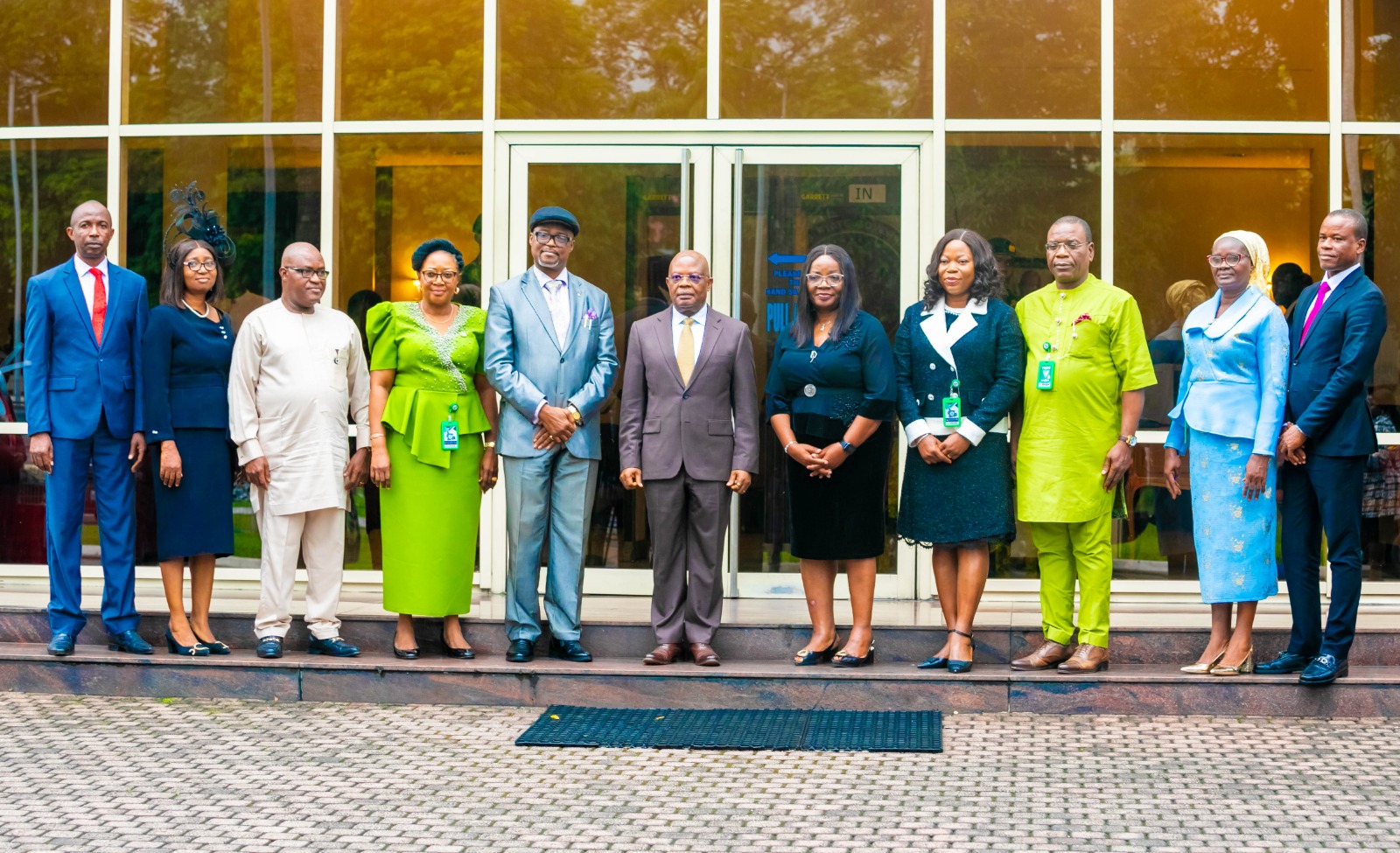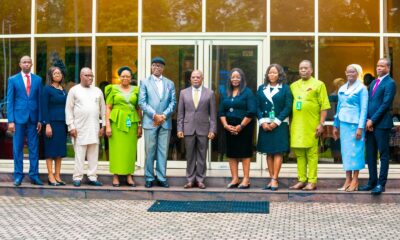Featured
Buhari, Dictator, Tribalist -Adebanjo …Says President’ll Lose 2019 Polls

A chieftain of Afenifere, a Yoruba socio-political organisation, Ayo Adebanjo, has described President Muhammadu Buhari as a dictator.
Adebanjo said this while reacting to the recent attack on top politicians in the opposition by the government, including the Senate President, Dr Bukola Saraki and his Deputy, Chief Ike Ekweremadu by security agencies.
Speaking with newsmen, the Afenifere chieftain noted that the actions of security agencies should not be a surprise to Nigerians.
Recall that the police had, last Tuesday, allegedly blocked the Senate President, Dr Bukola Saraki’s convoy at Lake Chad junction in Abuja.
Saraki was reportedly on his way to report to the police headquarters after he was invited for questioning by the Inspector-General of Police (IGP), Ibrahim Idris over Offa bank robbery when the incident happened.
Similarly, the Economic and Financial Crimes Commission (EFCC), had last week quizzed Ekweremadu over some undeclared property outside the shores of Nigeria.
Adebanjo recalled how he warned Nigerians against voting for Buhari in 2015 but his call was ignored.
He said, “What Buhari and security agents are doing now is not a surprise to me. Before the last election, I warned the whole country not to vote for him but they ignored me now they should know better.
“There is nothing he is doing now that he has not done before, they said that was during the military era and he will not do so during the democratic regime. I have always known him to be a dictator. I once met with Obasanjo and I warned them against Buhari but they felt I got money from Jonathan, now they know better.
“The achievements they are ascribing to him are fake. Buhari is a tribalist, an egoist, a communist, a conservative and feudalist of the first order. There is nothing he is doing now that he has not done before.
“I warned them but they never heed my warning including Obasanjo. I’m the only consistent critic of Buhari among those who are all shouting now.”
Similarly, Adebanjo, insisted that the defection of the Senate President, Dr Bukola Saraki and other bigwigs from the All Progressives Congress (APC) to the Peoples Democratic Party (PDP), would affect President Muhammadu Buhari’s re-election bid in 2019.
In a chat with newsmen, last Saturday, Adebanjo said most of the politicians defecting from APC worked for Buhari’s victory in 2015; hence their exit now would amount to the party’s failure in the next election.
It would be recalled that some 52 lawmakers in the National Assembly had about a week ago defected from the ruling APC.
Last Tuesday, the Senate President, Dr Bukola Saraki and Kwara State Governor, Abdulfatah Ahmed, joined Benue State Governor, Samuel Ortom to officially dump the ruling APC while joining the opposition PDP.
While Nigerians were still trying to savour the news of Saraki’s defection, Sokoto State Governor, Aminu Tambuwal also officially dumped APC for PDP.
Reacting to the gale of defections, the 90-year-old constitutional lawyer stressed that Buhari can only win the next election through rigging.
According to Adebanjo, “The issue is would Buhari have won the 2015 election without the participation of Saraki and all those defecting from APC? And if the answer is no, then Buhari will lose in 2019, Saraki’s defection notwithstanding.
“The image of Buhari in 2015 has deserted him now and besides the defections, Buhari’s performance is not enough for him to win.
“His failure is certain unless he rigs the election which he is planning to do. The defection of Saraki and the rest will only add to his failure during the next election.”
Featured
Rivers A Strategic Hub for Nigeria’s Blue Economy -Ibas …Calls For Innovation-Driven Solutions

The Administrator of Rivers State, Vice Admiral (Rtd.) Ibok-Ete Ibas, has emphasized the need for innovation-driven strategies, strategic partnerships, and firm policy implementation to fully harness the vast potential of the blue economy.
Speaking during a courtesy visit by participants of Study Group 7 of the Executive Course 47 from the National Institute for Policy and Strategic Studies (NIPSS) at Government House, Port Harcourt, on Monday, Ibas highlighted the importance of diversifying Nigeria’s economy beyond oil by leveraging maritime resources to create jobs, enhance food security, strengthen climate resilience, and generate sustainable revenue.
The Administrator, according to a statement by his Senior Special Adviser on Media, Hector Igbikiowubo, noted that with coordinated efforts and innovative solutions, the blue economy could serve as a catalyst for inclusive growth, economic stability, and long-term environmental sustainability.
“It is estimated that a fully developed blue economy could generate over $296 million annually for Nigeria, spanning fisheries, shipping and logistics, marine tourism, offshore renewable energy, aquaculture, biotechnology, and coastal infrastructure,” he stated.
“We must transition from extractive practices to regenerative, inclusive, and innovation-driven solutions. This requires political cohesion, intergovernmental collaboration, robust infrastructure, and institutional capacity—all of which must be pursued with urgency and intentionality,” he added.
Ibas urged sub-national governments, particularly coastal states, to domesticate the national blue economy framework and develop tailored strategies that reflect their comparative advantages.
He stressed that such efforts must be guided by disciplined planning, regulation, and investment to maximize the sector’s potential.
Highlighting Rivers State’s pivotal role, the Administrator outlined its strategic advantages as follows:
•Nearly 30% of Nigeria’s total coastline (approximately 853km)
•Over 40% of Nigeria’s crude oil and gas output
•More than 33% of the country’s GDP and foreign exchange earnings
•416 of Nigeria’s 1,201 oil wells, many located in marine environments
•Two of Nigeria’s largest seaports, two oil refineries, and the Nigerian Liquefied Natural Gas (NLNG) terminal in Bonny Island—one of Africa’s most advanced gas facilities
Despite these opportunities, Ibas acknowledged challenges such as pollution, coastal erosion, illegal oil refining, unregulated fishing, inadequate infrastructure, and maritime insecurity.
He reaffirmed his administration’s commitment to institutional reforms, coastal zone management, and inter-agency collaboration to build a governance structure that supports a sustainable blue economy.
“Sustainability must be embedded in our development models from the outset, not as an afterthought. We are actively exploring partnerships in maritime education, aquaculture development, port modernization, and renewable ocean energy. We welcome knowledge-sharing engagements like this to refine our strategies and enhance implementation,” he said.
He urged the NIPSS delegation to ensure their findings translate into actionable recommendations that address the sector’s challenges.
Leader of the delegation, Vice Admiral A.A. Mustapha, explained that the visit aligns with their strategic institutional tour mandate on the 2025 theme: “Blue Economy and Sustainable Development in Nigeria: Issues, Challenges, and Opportunities.”
The group is engaging stakeholders to deepen understanding of policy efforts and institutional roles in advancing sustainable development through the blue economy.
Featured
INEC To Unveil New Party Registration Portal As Applications Hit 129

The Independent National Electoral Commission (INEC) has announced that it has now received a total of 129 applications from associations seeking registration as political parties.
The update was provided during the commission’s regular weekly meeting held in Abuja, yesterday.
According to a statement signed by the National Commissioner and Chairman of the Information and Voter Education Committee, Sam Olumekun, seven new applications were submitted within the past week, adding to the previous number.
“At its regular weekly meeting held today, Thursday 10th July 2025, the commission received a further update on additional requests from associations seeking registration as political parties.
“Since last week, seven more applications have been received, bringing the total number so far to 129. All the requests are being processed,” the commission stated.
The commission revealed the introduction of a new digital platform for political party registration. The platform is part of the Party Financial Reporting and Auditing System and aims to streamline the registration process.
Olumekun disclosed that final testing of the portal would be completed within the next week.
“INEC also plans to release comprehensive guidelines to help associations file their applications using the new system.
“Unlike the manual method used in previous registration, the Commission is introducing a political party registration portal, which is a module in our Party Financial Reporting and Auditing System.
“This will make the process faster and seamless. In the next week, the commission will conclude the final testing of the portal before deployment.
“Thereafter, the next step for associations that meet the requirements to proceed to the application stage will be announced. The commission will also issue guidelines to facilitate the filing of applications using the PFRAS,” the statement added.
In the meantime, the list of new associations that have submitted applications has been made available to the public on INEC’s website and other official platforms.
Featured
Tinubu Signs Four Tax Reform Bills Into Law …Says Nigeria Open For Business

President Bola Tinubu yesterday signed into law four tax reform bills aimed at transforming Nigeria’s fiscal and revenue framework.
The four bills include: the Nigeria Tax Bill, the Nigeria Tax Administration Bill, the Nigeria Revenue Service (Establishment) Bill, and the Joint Revenue Board (Establishment) Bill.
They were passed by the National Assembly after months of consultations with various interest groups and stakeholders.
The ceremony took place at the Presidential Villa, yesterday.
The ceremony was witnessed by the leadership of the National Assembly and some legislators, governors, ministers, and aides of the President.
The presidency had earlier stated that the laws would transform tax administration in the country, increase revenue generation, improve the business environment, and give a boost to domestic and foreign investments.
“When the new tax laws become operational, they are expected to significantly transform tax administration in the country, leading to increased revenue generation, improved business environment, and a boost in domestic and foreign investments,” Special Adviser to the President on Media, Bayo Onanuga said on Wednesday.
Before the signing of the four bills, President Tinubu had earlier yesterday, said the tax reform bills will reset Nigeria’s economic trajectory and simplify its complex fiscal landscape.
Announcing the development via his official X handle, yesterday, the President declared, “In a few hours, I will sign four landmark tax reform bills into law, ushering in a bold new era of economic governance in our country.”
Tinubu made a call to investors and citizens alike, saying, “Let the world know that Nigeria is open for business, and this time, everyone has a fair shot.”
He described the bills as not just technical adjustments but a direct intervention to ease burdens on struggling Nigerians.
“These reforms go beyond streamlining tax codes. They deliver the first major, pro-people tax cuts in a generation, targeted relief for low-income earners, small businesses, and families working hard to make ends meet,” Tinubu wrote.
According to the President, “They will unify our fragmented tax system, eliminate wasteful duplications, cut red tape, restore investor confidence, and entrench transparency and coordination at every level.”
He added that the long-standing burden of Nigeria’s tax structure had unfairly weighed down the vulnerable while enabling inefficiency.
The tax reforms, first introduced in October 2024, were part of Tinubu’s post-subsidy-removal recovery plan, aimed at expanding revenue without stifling productivity.
However, the bills faced turbulence at the National Assembly and amongst some state governors who rejected its passing in 2024.
At the NASS, the bills sparked heated debate, particularly around the revenue-sharing structure, which governors from the North opposed.
They warned that a shift toward derivation-based allocations, especially with VAT, could tilt fiscal balance in favour of southern states with stronger consumption bases.
After prolonged dialogue, the VAT rate remained at 7.5 per cent, and a new exemption was introduced to shield minimum wage earners from personal income tax.
By May 2025, the National Assembly passed the harmonised versions with broad support, driven in part by pressure from economic stakeholders and international observers who welcomed the clarity and efficiency the reforms promised.
In his tweet, Tinubu stressed that this is just the beginning of Nigeria’s tax evolution.
“We are laying the foundation for a tax regime that is fair, transparent, and fit for a modern, ambitious Nigeria.
“A tax regime that rewards enterprise, protects the vulnerable, and mobilises revenue without punishing productivity,” he stated.
He further acknowledged the contributions of the Presidential Fiscal Policy and Tax Reform Committee, the National Assembly, and Nigeria’s subnational governments.
The President added, “We are not just signing tax bills but rewriting the social contract.
“We are not there yet, but we are firmly on the road.”
-
News3 days ago
South-South Contributes N34trn To Nigeria’s Economy In 2024 – Institute
-

 Women2 days ago
Women2 days agoWhat To Know About Fufu, Loi Loi
-
Rivers3 days ago
ASALGA Community Debunks Reports On Ownership Of Land Its Settlements
-
Business3 days ago
NCDMB Promises Oil Industry Synergy With Safety Boots Firm
-
City Crime2 days ago
RSG Tasks Federal Government On Maternal Deaths
-
News3 days ago
NOA Set To Unveil National Values Charter — D-G
-

 Featured2 days ago
Featured2 days agoRivers A Strategic Hub for Nigeria’s Blue Economy -Ibas …Calls For Innovation-Driven Solutions
-

 Rivers3 days ago
Rivers3 days agoNDDC Inaugurates Ultra-Modern Market In Rivers Community

